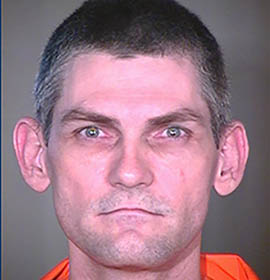Cronkite News has moved to a new home at cronkitenews.azpbs.org. Use this site to search archives from 2011 to May 2015. You can search the new site for current stories.
Appeals court upholds death sentence in Phoenix-area burglary murders
WASHINGTON – A federal appeals court Monday upheld an Arizona double-murderer’s death sentence, rejecting his argument that dual juries at a joint trial for him and for his co-defendant violated his right to a fair trial.
A divided three-judge panel of the 9th U.S. Circuit Court of Appeals also rejected James McKinney’s claims that he should not have had to wear a leg brace at trial, and that the sentencing judge failed to fully consider evidence of his traumatic childhood.
McKinney was convicted on two counts of first-degree murder and other charges stemming from a 1991 one-month burglary spree in the Phoenix metro area.
His attorney said Monday the defense had not decided how to respond to the court’s ruling.
“We just received the opinion, we will review it and make a decision about the appropriate action in the next few days,” said Ivan Mathew, McKinney’s attorney. “After studying the opinion, we might appeal, we might come up with other alternatives.”
Calls to the Arizona attorney general’s office were referred to the assistant attorney general who handled the case, who was not available for comment Monday.
The case began Feb. 28, 1991, when McKinney, his half-brother Michael Hedlund and two other men broke into Christene Mertens’ home where they thought they would find thousands of dollars in cash. Instead they ran off with nothing of value when Mertens came home and surprised them, court records said.
It was the first of five burglaries over the next several weeks. In the fourth of those crimes, McKinney and Hedlund returned to Mertens’ house and found her alone. They shot and stabbed Mertens – who died of a gunshot wound to the head – before making off with $120.
Almost two weeks later, they broke into the home of Jim McClain, shooting him in the back of the head while he slept before stealing a pocket watch, three handguns and his car.
Hedlund and McKinney were tried together, but the trial court empaneled separate juries, one for each defendant. Both men were also required to wear leg braces throughout the trial as a security measure.
The jury found McKinney guilty of two counts of first-degree murder, two counts of burglary and one count of theft. He was later sentenced to death on the murder counts.
In his latest appeal, McKinney argued that having two juries in the courtroom led to a “bizarre and prejudicial seating arrangement” in which he had to face jurors throughout his trial, a violation of his due process rights.
McKinney said that having defendants face the jurors was “intimidating and resulted in fundamental error requiring reversal,” according the court documents.
The appeals court disagreed, quoting the Arizona Supreme Court ruling that there is no “constitutional right to a standard American courtroom arrangement, and we decline to invent such a right.”
The appeals court also rejected McKinney’s other claims about the trial, saying they were procedurally barred. And the majority refused to grant him a new hearing on the evidence of his troubled life.
In her dissent, Judge Kim McLane Wardlaw agreed with the majority on most of the issues, but said that McKinney’s claim that he suffered post-traumatic stress disorder as a result of his difficult childhood was not fully considered by the sentencing judge. She said he should get a new hearing on that issue.
Wardlaw said McKinney’s PTSD evidence was “relevant mitigating evidence” and said the sentencing judge’s failure to adequately consider it had a “substantial and injurious effect or influence” upon the sentence. The majority disagreed, saying the judge did consider the evidence and did not merely pay “lip service” to that fact.







